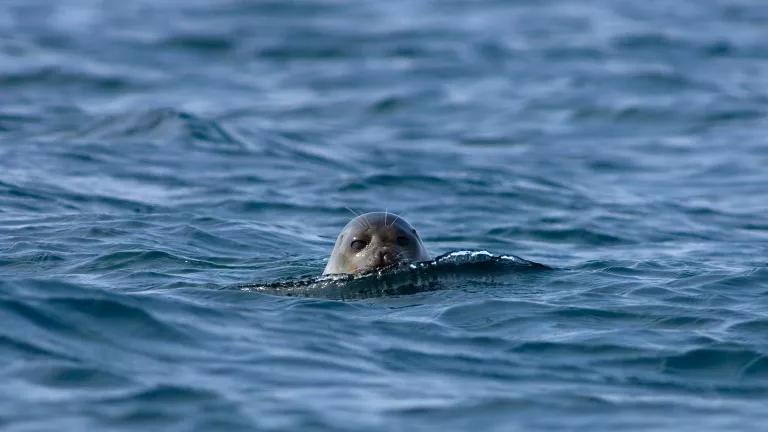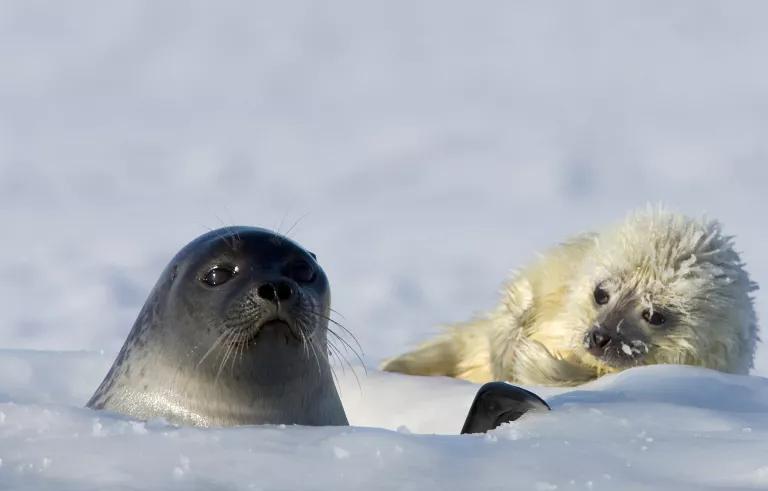Save the Ringed Seal, Save the Planet?
The government proposes the biggest critical-habitat designation ever to protect ringed seals from Big Oil and climate change.

A ringed seal swimming in the Chukchi Sea off Point Barrow, Alaska
The National Oceanic and Atmospheric Administration announced a proposal last week to set 350,000 square miles of Arctic ice and sea as critical habitat for the ringed seal. If implemented, the designation would be the nation’s largest in history, and could be a crucial step toward curbing oil and gas exploration in the region—while helping save seals, of course.
Why do ringed seals need a-saving? In a word: ice.
All four subspecies of ringed seal that are federally listed as either threatened or endangered can go their entire lives without ever laying a flipper on land. These animals rely on lairs carved out of sea ice for sanctuary from predators, as well as shelter for birthing, suckling, and molting (FYI: All those activities are adorable, even the molting).
And in case you hadn’t heard, the Arctic is experiencing a serious downward trend in sea ice coverage, with the possibility of becoming seasonally ice-free by midcentury. For ringed seals, that’s means their houses could melt for six months out of the year. Furthermore, as Big Oil lays more and more claim to the Great White North, the chance for spills goes up—way up, given the industry’s lackluster performance in the region thus far.
“The dangers of an oil spill in Arctic waters would obviously depend on where, when, and how big,” says Michael Kingsley, a senior professor at the Norwegian Institute of Marine Research, “but under the worst scenario, [a spill] could be locally catastrophic for ringed seals.”
If you thought BP had a tough time staunching and then cleaning up its gusher in sunny Gulf of Mexico, imagine how difficult it would be in the Arctic, where responders would have to contend with 20-foot waves, gale-force winds, subzero temperatures, and essentially no infrastructure.
It’s important to note that NOAA’s critical-habitat proposal would not outright ban oil drilling in the Arctic.
“The designation of critical habitat is not like designating a national park. It doesn’t place anything off-limits; it doesn’t prohibit economic activity,” explains Andrew Wetzler, the director of the land and wildlife program at NRDC (which publishes Earthwire).
Rather, the Endangered Species Act mandates that agencies designate critical habitat for threatened or endangered species as an extra precaution toward their well-being. (Essentially, the government tells industry to look before it leaps. Or more plainly, don’t go into those areas and be a jerk.)
In the case of the ringed seal, oil and gas companies would have to be especially careful because they have ways of endangering sea life without ever spilling a drop of crude. In its proposal, NOAA cites concerns over seismic surveys, the construction of artificial islands, ice roads, pipelines, and disruptions caused by aircraft and ice-breaking ships.
Ice-breaking ships, for example, can harm sea ice quality (obviously), and guess what: ‘Dem ice-breakers are LOUD. Like most sea mammals, seals are able to detect low-frequency sounds below water, which helps them communicate and find food. Loud noises that travel beneath the waves for miles could mess with those behaviors. (This issue has been well-documented in other marine mammals like whales, but NOAA notes the ringed seal studies have been “variable and often contradictory.”) Harmful to hearing or not, the ships are breaking up the animal’s habitat.
Finally, let’s discuss the elephant seal in the room: climate change.
All animals that rely on sea ice will be affected by climate change, says Kingsley. In fact, he says, it’s probably the most serious threat for ringed seals.
Sea ice doesn’t even have to completely disappear to affect seal populations. One study found that polar bears gobbled up four times as many ringed seal pups during a year when average snow depths decreased from nine to four inches. Seven other studies revealed that when snow accumulation is low and/or melts early, ravens and seagulls are able to pick apart more pups.
A critical-habitat designation for ringed seals (which is currently undergoing a 90-day public comment period) wouldn’t magically fix the ice-loss problem, and as mentioned before, it would still allow for fossil fuel exploration. But the move, Wetzler notes, would help the Obama administration reconcile its climate and energy policy.
“If we’re going to get serious about climate change,” he says, “then we need to keep the fossil fuels in the Arctic in the ground.”
Whether we do it for the seals, the preservation of the region, or as a baby step toward combating climate change, any designation that requires more responsible drilling practices is a win. After all, nobody wants to see this face covered in crude.

This article was originally published on onEarth, which is no longer in publication. onEarth was founded in 1979 as the Amicus Journal, an independent magazine of thought and opinion on the environment. All opinions expressed are those of the authors and do not necessarily reflect the policies or positions of NRDC. This article is available for online republication by news media outlets or nonprofits under these conditions: The writer(s) must be credited with a byline; you must note prominently that the article was originally published by NRDC.org and link to the original; the article cannot be edited (beyond simple things such grammar); you can’t resell the article in any form or grant republishing rights to other outlets; you can’t republish our material wholesale or automatically—you need to select articles individually; you can’t republish the photos or graphics on our site without specific permission; you should drop us a note to let us know when you’ve used one of our articles.

Bringing the Noise
Think You Know What Water Looks Like? Take a Look at This.
Zinke vs. Coastal Governors